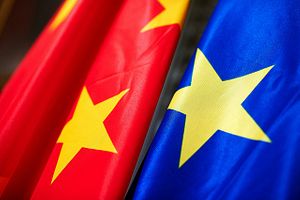On April 18, Beijing hosted the 7th European Union-China Strategic Dialogue which was chaired by Federica Mogherini, the EU’s High Representative for Foreign Affairs and Security Policy, with Chinese State Councilor, Yang Jiechi. The meeting came ahead of the Belt and Road Forum for International Cooperation scheduled to take place in Beijing in mid-May and the EU-China annual Summit scheduled for Brussels in June.
The agenda of the discussions encompassed topics such as trade, investment, innovation, people-to-people exchanges and other areas, according to a press release published by the Chinese government. Both sides agreed to work with each other on the Hamburg G20 Summit, the Paris Agreement on climate change and the 2030 Agenda for Sustainable Development.
Some voices claimed that the Strategic Dialogue Meeting was just one of multiple steps China has taken in its “charm offensive” with the EU, with the intent to charm America’s European allies in the context of new U.S. President Donald Trump’s “America first” protectionist policy. This was the first high-level encounter between the EU and China parties since the November U.S. presidential election.
A meeting between Chinese Premier Li Keqiang and Mogherini took place the same day as the dialogue meeting and emphasized the importance of the relations between the EU and China on matters of free trade and open engagement in light of a complicated and changeable international order and considering the rise of the anti-globalization and protectionism trend.
Mogherini declared in an interview for Xinhua that “The European Union and China share the view of a global order based on multilateralism and on the UN system: our cooperation has never been so important, in a moment when multilateral global governance is put in question from many sides.”
The speculations some Chinese specialists made after Trump took office in Washington, that an axis will form between Beijing and Brussels and that it will represent an alternative to the relationship between the United States and China, which has dominated the economic world system for the last decade, seems more accurate than ever.
In January, President Xi Jinping stated at the World Economic Forum in Davos that China will become a champion of free trade and stability, while speaking against protectionism. In Beijing, Mogherini referred to this speech when she said it “raised high expectations that China and the European Union can work together on multilateralism, on rules-based global order” and trade.
Nevertheless, China and the EU also have many disagreements that cast a shadow on their relationship, such as the difficulties European and other foreign companies have faced while trying to acquire Chinese assets, or the sharp restrictions in telecommunications, information technology, finance and other promising sectors, in violation of Beijing’s free-trading pledges. Meanwhile, Chinese companies are buying major global brands and investing massively in Europe (with a 77 percent increase in 2016). The EU is also concerned about China’s massive steel exports, its militarization of islands in the South China Sea and a turn towards greater authoritarianism under President Xi.
Beijing, for its part, wants the EU to grant it market economy status within the WTO. China urged the EU to fulfill its obligations under Article 15 of the protocol on China’s accession to the WTO at an early date, so as to give a positive signal on backing a free and open multilateral trading system. Chinese State Councilor Yang said that China hopes EU lawmakers will change their stance on the matter soon. Other points of dispute between Beijing and Brussels include China’s increasingly restrictive civil society environment and internet censorship.
The two parties are aware of these disagreements and it was Chinese Premier Li who said during his meeting with Mogherini that, “By settling differences through dialogue, bilateral relations will develop within the rule-based framework of international order, thus injecting vitality for the world economy.” Li also referred to the bilateral investment treaty that the EU will sign with Beijing, which will make it easier for European companies to do business in China.
Mogherini has continued her diplomatic tour in Asia through the weekend, with stops in India and Russia.
Valentina Crivăț is a fellow at The Romanian Institute for the Study of the Asia-Pacific (RISAP) and holds a LLM in International Law from China University of Political Science and Law.

































